Lithospheric-scale dynamics during continental subduction: Evidence from a frozen-in plate interface
IF 4.8
1区 地球科学
Q1 GEOLOGY
引用次数: 0
Abstract
Continental subduction and collision are not merely follow-ups of oceanic subduction but mark the transition from lithospheric-scale deformation localized along the subduction interface to crustal-scale deformation distributed across the orogen. In order to unravel the processes typifying the dynamic changes from oceanic subduction to collision, we have characterized the pressure-temperature (P-T) and spatio-temporal evolution of rocks on each side of the tectonic contact (Briançonnais−Liguro-Piemont [Br-LP] contact) separating the subducted oceanic remnants from the subducted continental fragments along the Western Alps. Results indicate that the maximum temperature and pressure difference on each side of the contact is generally <30 °C and <0.3 GPa, evidencing that no significant metamorphic gap exists. The preservation of similar P-T conditions on both sides of the Br-LP contact is interpreted as resulting from offscraping of the Liguro-Piemont and later Briançonnais units at similar depths, as supported by the ∼10 m.y. gap between peak burial ages of both zones. The similar depth range reached by the various units reflects systematic variations of slicing and mechanical coupling along the plate interface suggesting that (1) similar slicing mechanisms and strain localization prevailed during both oceanic and continental subduction, and (2) the Br-LP contact represents a frozen-in subduction interface. The end of high-pressure and low-temperature metamorphism and continental subduction at ca. 33 Ma would mark the stalling of subduction interface dynamics and the onset of strain distribution across the plate interface and into the lower plate.大陆俯冲过程中的岩石圈尺度动力学:来自冻结板块界面的证据
大陆俯冲和碰撞不仅是大洋俯冲的后续,而且标志着从局限于俯冲界面的岩石圈尺度变形向分布于整个造山带的地壳尺度变形的转变。为了揭示从大洋俯冲到碰撞的动力变化过程,我们对西阿尔卑斯山脉洋残岩与陆残岩的分离构造接触(brianonnais - liguroo - piemont [Br-LP]接触)两侧岩石的压力-温度(P-T)和时空演化进行了表征。结果表明,触点两侧的最大温差和压差一般为30℃和0.3 GPa,表明不存在明显的变质间隙。在Br-LP接触面两侧保存类似的P-T条件被解释为在相似深度的liguroo - piemont和后来的brianonnais单元的剥落造成的,这是由两个带的峰值埋藏年龄之间约10米的差距所支持的。各单元达到的相似深度范围反映了沿板块界面的切片和力学耦合的系统变化,表明:(1)洋陆俯冲期间普遍存在相似的切片机制和应变局部化;(2)Br-LP接触代表了一个冻结的俯冲界面。约33 Ma的高压低温变质作用结束和大陆俯冲作用结束,标志着俯冲界面动力学的停止和跨板块界面向下板块应变分布的开始。
本文章由计算机程序翻译,如有差异,请以英文原文为准。
求助全文
约1分钟内获得全文
求助全文
来源期刊

Geology
地学-地质学
CiteScore
10.00
自引率
3.40%
发文量
228
审稿时长
6.2 months
期刊介绍:
Published since 1973, Geology features rapid publication of about 23 refereed short (four-page) papers each month. Articles cover all earth-science disciplines and include new investigations and provocative topics. Professional geologists and university-level students in the earth sciences use this widely read journal to keep up with scientific research trends. The online forum section facilitates author-reader dialog. Includes color and occasional large-format illustrations on oversized loose inserts.
 求助内容:
求助内容: 应助结果提醒方式:
应助结果提醒方式:


